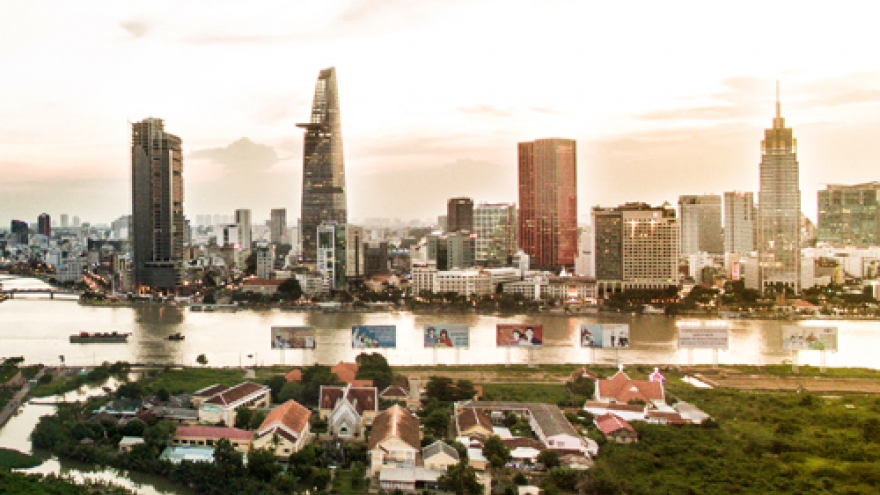Real estate firms breaking the mould
2016 was a successful year for the real estate market. However, with the fast growth of the economy and the real estate market, real estate developers are being forced to diversify products and apply more advanced technologies to anticipate the market of 2017.
 |
“This idea shows our efforts to respect our buyers. We believe that buyers will stay a long time with our projects, so we wanted to offer them something very special, very attractive,” said a representative from Sacomreal.
“This is what we need to do to woo buyers in a competitive market.”
Sacomreal’s innovation directly targeted home buyers who wish to cultivate vegetables by themselves to ensure food security. Having a space for gardening is a dream of many prospective homeowners, who mostly sacrifice that hope for the convenience of living closer to the city.
Other developers have also looked for ways to differentiate their products.
Novaland public relations director Nguyen Thuy Duong carefully thought about how to promote Novaland’s activities in 2017 – a milestone year for the company.
With 24 years in real estate development, Novaland’s brand is now entering its most important time yet. The company is considering innovations to better equip themselves to cope with the increasing demand of the market.
In its development strategy, Novaland assigns five core standards to a real estate project: good location, reasonable pricing, suitable zoning, a track record of schedule and quality, and high liquidity.
However, in order to keep up with the increasing demands of the market, developers like Novaland must diversify their portfolios.
From its core field of residential development, Novaland has been expanding into officetels, resorts, and hotels.
According to Greg Ohan, business development director of real estate consultancy JLL Vietnam, due to increased investment across all real estate sectors, certain local developers have stepped up their capabilities and improved their products, services, and offerings. This has allowed them to compete on a regional scale while remaining competitive in a local market now offering more options and choice.
Ohan said that in the residential sector, 2016 saw Vietnam’s first central business district (CBD) luxury residential project launched by a foreign developer, “D1mansion”, through CapitaLand. The project, which was launched internationally in Singapore last year, has yet to be launched in Ho Chi Minh City.
“The development attracted very strong demand and secured prices not seen in the Ho Chi Minh City CBD since pre-2006. Following this, local developer Son Kim Land recently launched a comparable CBD luxury project in January 2017, offering a quality not seen by a local developer prior, setting a high benchmark for all local and international residential developers,” Ohan said.
In order to attract more buyers to their projects, in addition to run-of-the-mill incentives such as discounts, lavish presents, and exemptions from management fees, developers have started creating additional incentives for prospective buyers.
Many projects have now started to sell units when they are nearly finished, instead of selling units in advance. This gives confidence to buyers that they will be handed their units on time, without delay.
According to Vu Anh Tam, general director of Tai Nguyen Real-Estate JSC and the developer of the Kenton resident project in Ho Chi Minh City, buyers only have to pay 30 per cent of the price for the project’s units before they can move in.
Thu Duc House in Ho Chi Minh City’s District 9 has implemented the same policy. Le Chi Hieu, general director of Thu Duc House, said that changing the way of selling products is necessary to help his projects stand out from the hundreds of other projects in the same segment.
“If you do not change your mindset and business approach, you can find yourself in very difficult circumstances,” Hieu said.
Many other marketing tools are also being used in real estate promotion, such as advertising in social media and advanced technologies in sales management to reduce cost and risk.
Consultants have been introducing another method of diversification – those relating to capital inflows. Some have introduced Vietnam-based projects to Singaporean investors, which has resulted in a number of these investors coming to Vietnam to make real estate purchases.
Other developers have set up special teams to deal with Japanese, Korean, and Chinese buyers.
Innovations have also been seen in the industrial real estate sector, where local industrial park operators have improved their service offerings across the country, by partnering with a variety of experienced Japanese, Malaysian, and Singaporean developers.
Factory and warehouse developers offer high-quality, international standards-based, incubation space, ready-built warehouses, and ready-built factory space to satisfy the requirements of multinational manufacturers.
As the market matures, so too have the promotional mediums local developers have been employing.
In the past, print media – particularly glossy magazines and local and foreign newspapers – were a critical part of any developer’s ‘below the line’ marketing campaign.
While many developers and agencies tend not to respect privacy and continue to spam through cold-calling, SMS, and smartphone applications, others have shifted to more innovative, cost-effective, and far-reaching mediums – in particular, those in social media.
Online advertising is only expected to continue. As demand for Vietnamese property has now secured regional attention, such mediums have allowed local developers to expand their reach and cater to rising foreign investment interest.



